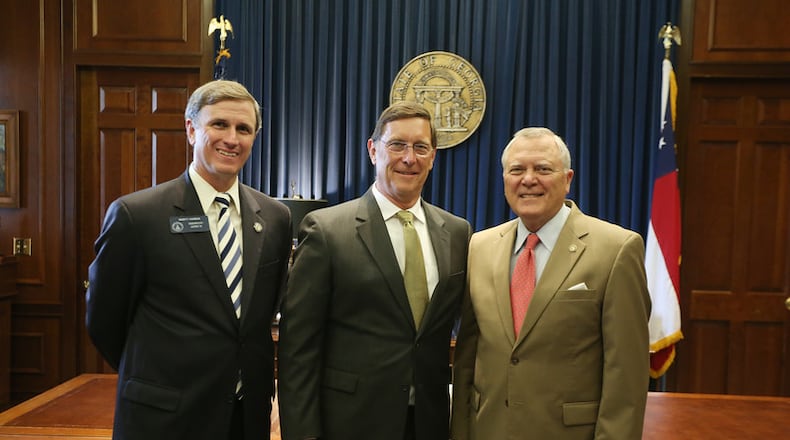In 2012, Patrick Millsaps was the top dog in Newt Gingrich's Republican campaign for president.
The U.S. Supreme Court hadn’t yet made its call, and the constitutionality of same-sex marriage was only legal theory. Gingrich opposed it, and Millsaps helped his candidate express himself.
Four years later, Millsaps still calls Albany, Ga., home, but his cell phone number flashes a new geographic orientation: “Beverly Hills.”
He had seen the wealthy spend millions of dollars on a political campaign, without blinking and with no return on their investment. “So I knew there was a bunch of rich people in the country that would spend their money on silly things,” said Millsaps, 43. He took his list of well-walleted contacts and joined an industry that may have just made its first big impact on Georgia politics.
In December, Millsaps and a California talent developer set up Londonderry Entertainment, a firm that matches movie projects with talent and money. Talent is cultivated in California. The company’s financial office is in Gainesville.
"One hundred percent of our investors had never invested in show business. And 80 percent of them are in Georgia,” Millsaps said. “It’s no more risky than farming and praying for rain.”
On Monday, Gov. Nathan Deal vetoed House Bill 757, the "religious liberty" bill intended to give legal shelter to opponents of same-sex marriage. A day later, Millsaps offered his reaction on Facebook. He praised Deal and condemned all other sides.
“So your politicians did it again. They invented an issue, drew some battle lines, and riled up their sides so that we hate on each other just a little bit more,” Millsaps wrote. “And in this case they used an issue to play chicken with Georgia’s economy.”
When the governor announced his veto decision, he expressed himself primarily as a theologian and constitutional scholar. Deal mentioned threats of an economic boycott only in order to dismiss them as a motivation.
Yet the warnings were real. As they had in two previous years, Georgia’s business giants weighed in against the legislation: Delta Air Lines, Home Depot, Coke, and more.
But in this year’s fight, no sector muddled Republican battle lines like Georgia’s burgeoning but vulnerable film industry. Thirty percent tax credits brought $6 billion in movie business into the state last year. Technical colleges, at the state’s direction, have adjusted their courses to create an employment pipeline for studios.
The governor of North Carolina signed a “religious liberty” bill that erased local anti-discrimination protections only days before Deal made his own decision. One difference: Gov. Pat McCrory, a Republican, faces re-election this year.
Another difference, according to Millsaps: North Carolina is a fine, scenic venue for film-makers. But Georgia has far more invested in the infrastructure of movie-making, the sound stages and studios — and thus had more to lose.
One of the busiest is the 700-acre Pinewood Studios in Fayette County, cited by MovieMaker Magazine when it ranked Atlanta as the No. 1 place for on-location filming in the country. The prime mover behind Pinewood Studios is Chick-fil-A CEO Dan Cathy.
Yes, that Dan Cathy. The one targeted by LGBT forces in 2012 when he condemned gay marriage. (A truce was eventually achieved.)
Pinewood is currently playing host to the makers of Marvel Studio's "Captain America: Civil War," expected to hit theaters in May. Marvel, like Disney, had threatened to take its business elsewhere if Deal signed HB 757.
So a Marvel boycott of Georgia might have threatened not just one of the biggest new job centers on the south side of metro Atlanta, but also might have jeopardized a major investment by one of the most influential religious conservatives in Georgia.
Muddled lines, indeed. And it doesn’t stop there.
Early this month, businessman Jim Pace announced his candidacy for the Third District congressional seat now held by Lynn Westmoreland of Coweta County. Westmoreland isn’t running for re-election.
Pace spearheaded the group of investors who helped Cathy bring Pinewood Studios to metro Atlanta.
On Monday, state Sen. Mike Crane, R-Newnan, another candidate for Westmoreland’s seat, immediately called for a special session of the Legislature to override the governor’s veto of HB 757. Which is highly unlikely to convene.
But in a fundraising email that also criticized the veto, Crane included this line: “The Liberal Hollywood elites are taking advantage of Georgia’s hospitality and are now trying to impose their ideology onto our residents.”
Next time, Crane is likely to attach Pace’s name to that sentiment.
Pace declined to address the governor’s veto of HB 757. But he released a statement through his spokesman that included this: “As a lifelong Christian, I believe what the Bible says is more important than what the Supreme Court says, and as an American, I have the right to think and speak Christian viewpoints.”
Pace endorsed a federal First Amendment Defense Act already backed by U.S. Sens. Johnny Isakson and David Perdue. “I appreciate any effort to strengthen religious freedom, but what we really need is a federal law that will restore Georgians’ fundamental rights,” Pace said.
A federal approach, by removing the focus on individual states, would also defuse the growing enmity between the business and social conservative wings of Georgia’s Republican party. The crossfire is only going to get more intense next year.
And because of what Governor Deal did on Monday, the movie business in Georgia is only going to get bigger.
About the Author
The Latest
Featured




